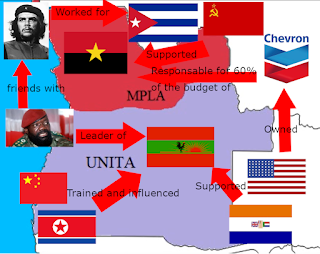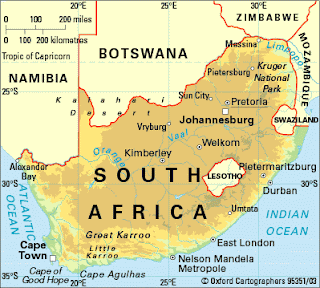Afghanistan
–country
situated between the Middle East and the Indian-Pakistani Space and named by
Arnold Toynbee ‘crossroads of the ancient world’ thanks to its geopolitical
position in the Greater Middle East.
To its east lies the great Muslim neighbor
Pakistan, where many Taliban afghan leaders took refuge, permanent source of
Islamic fundamentalism. West of Afghanistan lies the Iran of Shia faith and
north of it, the former soviet republics, Uzbekistan, Tajikistan and
Turkmenistan.
A narrow territorial
corridor called Wakhan assures an isolated and odd connection with China, just
like the Namibian Caprivi Strip, both of them being inherited colonial
creations which amplify the ethnic tensions more then they fix them, (see
Namibia).
Afghanistan is shattered
by numerous interethnic wars, especially after proclaiming its independence in
1919 when it becomes a monarchy. After 1973 when it declares itself a republic
under the leadership of Muhammad Daud, Afghanistan becomes the scene of
struggles for power between the Islamic conservatory parties and the
reformatory ones backed up by the two great military powers (USSR and USA) from
the 1980’s.
In 1979, the new
president, Babrak Karmal solicits the intervention of the soviet army in order
to fix the political situation in this country which was powerfully divided
between tribes. The soviets’ involvement results in more chaos. They lose until
1988 (the year of their retreat) over 15 thousand troops and their ideological
influence which they would have wanted to use in the region.
The civil war generates a
race for arming the over 20 ethnical and religious groups in the region: Tajiks
as well as Uzbeks and Turkmens in the north, Pashtuns and Hazara in the center,
Baloch in the south and Hindus. These are helped by the US, which also support
the Mujahedeen and Taliban. Hundreds of millions of dollars from CIA accounts
went to the Tajik tribes from the further north and to the Pashtun, because
they were the ones that fought with determination and success against the
soviet troops.
At the same time, the USSR supported the communist
government, which has as consequences loss of human lives (1.5 million civils),
5 million refugees at the end of the soviet occupation spread all around
Pakistan and Iran and huge material damage.
After the numerous peace
treaties and the UN intervening end the war, power goes to the Mujahedeen and
the radical Taliban that proclaim an Islamic republic with a harsh internal
policy, which hinder fundamental rights and liberties.
The retreat of the
soviets was the moment when things complicated because Saudi Arabia, Egypt and
Israel started funding various ethnic groups. This allowed for the creation of
small armies which proved to be hard to defeat in the USA’s war with the
Taliban.
The association of the
Taliban government with the Al Qaeda leader, Osama Bin Laden and the help given
in the terrorist attacks in the Kenyan capital, Nairobi, in 1998 and the WTC in
2001 gave birth to the USA’s violent answer and the foundation of a coalition
against terrorism whose members span countries all over the world.
Nowadays, the
government’s and the president’s authority (Hamid Karzai, the first one
democratically elected followed by Ashraf Ghani in 2014) barely exceeds the
Kabul’s margins. In other parts of the country, self-proclaimed regional rulers
and members of the feared Panjshiri mafia (opium business, domain where the
country is the world leader) have control over more than 80% of the territory.
The medium life
expectancy in Afghanistan is 44 years, the urbanization rate is below 30% and
in the UN’s Human Development Index this country is somewhere near the last
places. Only a fifth of the population has access to potable water and the
alphabetization rate is only 28%. All these elements signify a collapsing state
because of the continuous wars in the last century.
According to the
classification by Robert Cooper, Afghanistan is a pre-modern state, a kind of
‘terra nullius’ where the different ethnic and religious groups (see the Hazara
people’s situation from the country’s center, religiously persecuted because of
their belonging to the Sunni current) organize the land based on feudal
principles.
This state’s conflict’s
situation is an extremely volatile one, the Taliban insurgency still being very
active (the last terrorist attacks from January 2018 with booby-trapped cars
destabilize the country), the opium mafia being very strong and the Iran’s and
Pakistan’s influence growing amongst the poor population.
President Ashraf Ghani is
making constant appeals to the Taliban leader, Maulvi Haibatullah Akhunzadah
regarding truces or peace negotiations, however they desire direct
conversations with US officials, who they consider “foreign occupation’’. The
civil war continues despite the timid democratic evolutions regarding free will
and the creation of powerful institutions with the help of the coalition
against terrorism
The positive results of
the measures taken by the aforementioned coalition lead by the United States
are also visible. The medical and education systems look better now. Nearly 6
million refugees from the neighboring countries have returned to their homes;
there exists a pretty strong, well-trained and equipped army and over 8 million
children who go to school including 3 million girls.
![]() 21
mars International Day for the Elimination of Racial
Discrimination
21
mars International Day for the Elimination of Racial
Discrimination![]() 25 mars International Day for the Commemoration of Victims of
Slavery and Transatlantic Trade with Slave
25 mars International Day for the Commemoration of Victims of
Slavery and Transatlantic Trade with Slave7 april International Day of Reflection on Genocide in Rwanda
![]() 29 april International Day of Commemoration of All Chemical
War Victims
29 april International Day of Commemoration of All Chemical
War Victims8 may World Red Cross and Red Crescent Day
29 may The UN Peacekeeping Force International Day
4 june International Day of Child Victims of Aggression
![]() 20
june Refugees
Worl Day
20
june Refugees
Worl Day26 june International Day for Supporting Torture Victims
![]() 12 july Malala
Day
12 july Malala
Day ![]() 18 july Nelson
Mandela International Day
18 july Nelson
Mandela International Day19 august World Day for Humanitarian Assistance
![]() 29 august
International Day Against Nuclear Tests
29 august
International Day Against Nuclear Tests ![]() 17
october International Day for
Eradication of Poverty
17
october International Day for
Eradication of Poverty ![]() 6
november International Day for
the Prevention of Environmental Exploitation during War and Armed Conflict
6
november International Day for
the Prevention of Environmental Exploitation during War and Armed Conflict9 november International Day Against Fascism and Anti-Semitism
![]() 16
november International Day of Tolerance
16
november International Day of Tolerance25 november International Day for the Elimination of Violence Against Women
![]() 29 november International Day of
Solidarity with the Palestinian People
29 november International Day of
Solidarity with the Palestinian People![]() 10
december Human Rights Day
10
december Human Rights Day![]() 18
december International Day of Migrants
18
december International Day of Migrants

.jpg)















.jpg)






